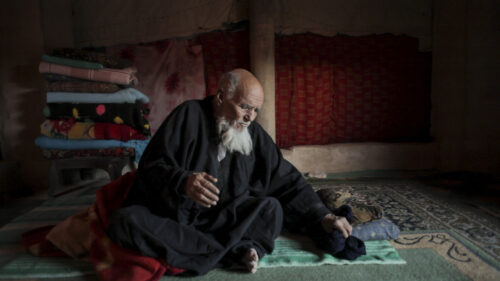IDOCLAB enters its second workshop and the final stage for the 10 selected projects. On December 5, 2023, Francesco Montagner attended the event as the mentor. He is an Italian director who has won various international documentary awards and is included in The Best 25 European Short Competing for The 2023 EFA Awards. Francesco shared his knowledge and experience as a documentary film director.
According to Francesco, the reality in documentary film must be shaped and not simply presented as is. The filmmakers must be ambivalent, thinking of the film structure while having the flexibility to see and follow the direction of reality brought by the characters in the film. They need to stand on two feet to cultivate freedom in a limited structure. Although impossible to make a set rule in producing a documentary film, Francesco shared documentary directing tips with the participants. Things that, according to him, directors and producers need to ask themselves.
First, to what extent does the filmmaker have to access the story and its characters? Documentaries sometimes raise sensitive issues that the character itself does not want to be seen by others. In that way, filmmakers must be aware of certain gaps before starting to work on the film.

The filmmaker must be open to the reality of the story and must not impose their perspective. Characters are an important key to the story as they experience the conflict and are the bearer of the main theme. Thus, it is important to know how ready they are to collaborate and go deep with the filmmaking team. Ideally, filmmakers need to have active and lively characters because documentaries tend to be based on empathy that is transmitted to the audience through how the character faces the difficulties they encounter to achieve their goals.
The second is the structure. The filmmaker must be aware of evolving their style to explore the characters’ emotions. Filmmakers must also be sensitive to certain triggers that could affect the character’s emotions to be able to see and make a turning point in the story. Francesco said filmmakers should know and love the story they are creating to have an emotional bond between the filmmaker and the characters.
Francesco gave tips to the participants on how to manage the characters. The first is to give a character archetype. Archetypes and labels are not given to judge the characters but rather to describe the personage of the character. This is important as the archetype affects the filmmaker’s consistency in narrating the character. The second is to find the core story carried by the characters. The filmmaker has to know the film’s main theme and must be able to work on the story that has been determined while still understanding what the characters want to achieve, even if they don’t express it explicitly.

Every scene in the film must have a meaning. For that to happen, there must be a distance between the filmmaker and their work because the characters should be left free and keep their privacy, as documentaries are not CCTV recordings. Dramatic scenes that have the potential to be included in the film may not be recorded because the characters deliberately hide their problems from the filmmaker’s lens. To discover these problems, the filmmaker must prioritize both sensibility and etiquette, as the filmmaker cannot direct the characters straight away but is able to control scenes that can represent the theme naturally.
For Francesco, directing a documentary is like throwing a pebble into a lake. The pebble will bounce around before eventually sinking to the surface. In a documentary, the filmmaker must be keen to see those reflections. The reflections are reactions to reality that give themes to characters and stories.
In addition, filmmakers must be sensitive towards their character. After all, the reality shown in the film is the character’s reality and they have rights and certain boundaries to dictate the extent to which their life may and can be recorded. The filmmaker’s artistic choices and vision influence the reality image experienced by the character. The way of processing reality also needs to be followed by efforts from the filmmaker to the documented character. With this in mind, filmmakers must be able to find the right way to make their characters understand and agree to the consequences of making the documentary. The filmmaker should also show the final result of the documentary to the subject they appoint as character before distributing to the public.
The ending of a documentary film is not the end for the character’s life. The character still has their life to live after the documentary finished production. Therefore, the filmmaker must have a strong statement to make the ending. It does not have to come from a certain emotional scene, but could also be from the filmmaker’s perspective and reflection of the theme and characters.

Again, in many cases, the filmmaker needs to build a close relationship with the character or subject of the film. The filmmaker must be able to provide a safe space for them and the reality they offer to document. “Director is not a dictator,” Francesco asserted.
The second phase of IDOCLAB is held for a week from 3–9 December 2023, with a series of intensive workshops discussing documentary filmmaking techniques and practices. At this stage, the participants will present their advanced research results in front of mentors and decision-makers to later decide 5 selected projects entitled to production funds.
Covered by Hesty N. Tyas on December 5, 2023.



